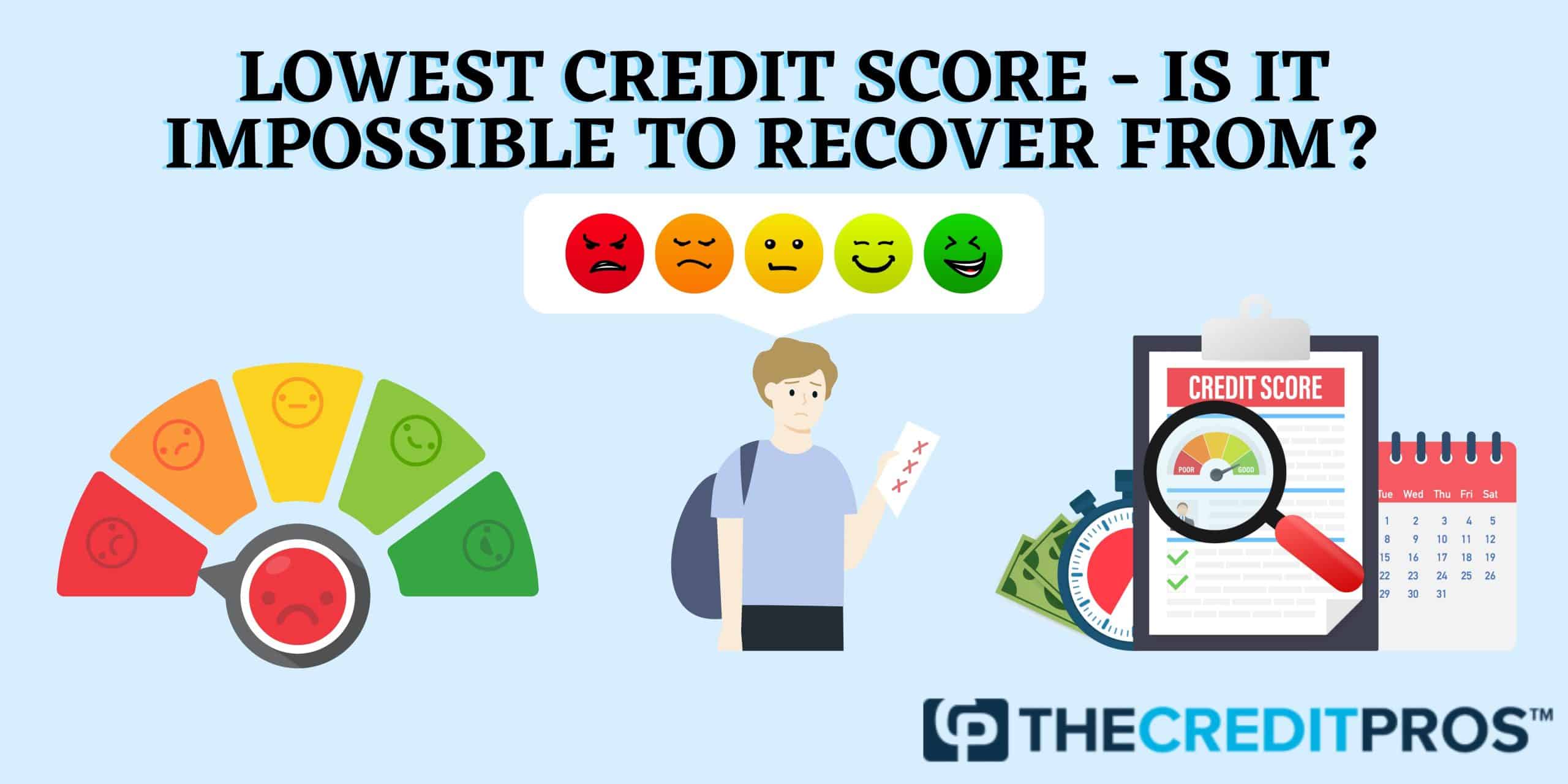Lowest Credit Score in 2023 – Is It Impossible to Recover From?
One of the main reasons why having the lowest credit score is bad for your financial life is that it is hard for you to get qualified for a credit card or loan, and you can be charged higher annual fees, additional fees, and higher interest rates. The first thing your lender or credit card issuer looks for to see if you are a responsible borrower is your credit score. Businesses get to identify if you are good at repaying debts.
So, if you have a low credit score, you should start to work on improving your bad credit score by following some good financial practices consistently to gain a good or average credit score, which will definitely be helpful for your financial needs in the future.
Is It Impossible To Get a Loan with the Lowest Credit Score?
Will you automatically get rejected for a loan if you have a low or average credit score? No, your score is not the one and only factor financial institutions consider before approving you for a loan or credit card.
There are other factors you next to have a good credit score that can be taken into account by lenders for example, if you have a stable income, a good amount of savings, and do not have pre-existing debt, you can still be approved with the lowest credit scores, and even a decent interest rate and credit limit.
But, it is better to start working on improving your credit scores to get a higher chance of approval, a low-interest rate, and other benefits. The lowest credit score is 300, and you need to have at least double the score to get approved for some types of credit cards and loans.
According to a source from Experian Automotive, borrowers who represented new auto loans are below 4%, as they had credit scores of less than 500. The average credit was 714 for new car loans, and the average credit was 661 for loans on used cars.
The main drawback of getting approved for a loan with the lowest credit score is that you will have to pay the interest as it keeps increasing over the course of time. For instance, the APR (Annual Percentage Rate) can double if you get a credit card with a credit score of 500, rather than with a credit score of 720. You also can not get a higher credit limit for credit cards as well.
What Are the Reasons for Having the Lowest Credit Score?
There are many reasons why you ended up with the lowest credit score. This includes:
1. Length of Your Credit History
Your credit history plays an important role in your credit score, and if you do not have a long history of credit, the average of your score could get lower. Of course, some people who are in their 18-20 age group can not possibly have a long credit history and good credit scores.
2. High Credit Utilization Ratio
The amount of credit you utilize, and your available credit are what make up the credit utilization ratio. Your credit utilization ratio has a 30% importance rate in your credit score, utilizing too much of your available credit can make your credit score plummet.
3. Late or Missed Payments
If you have an unpaid bill that is 30 days past the due date, your late payment is reported to the three credit reference agencies, Equifax, Experian, and Transunion by your creditor. 35% of your credit score depends on your payment history, and so it is a crucial factor that makes your credit scores lower.
4. Debt Collection
If you have defaulted on any payment of your debt obligation, your debt can be sold to a debt collecting agency or collector by your lender. This will be immediately reported to the credit bureaus. Your credit score can significantly go down if there is a collection in your credit report. It can take seven years for you to remove it from your credit report.
5. Bankruptcy
Your credit score can be negatively affected for up to 10 years if there are any bankruptcy listed on your credit report. Based on what the filings are, the length of time bankruptcy stays on your credit report varies, like seven years if you are filed for Chapter 13 and 10 years for Chapter 7.
What Are the Risks of Having the Lowest Credit Score?
Your finances can be harmed in several ways if you have the lowest credit score, which includes:
1. Denial of Loans
Every lender has a minimum requirement for a credit score, and you will not be able to meet them with the lowest credit score. You can not get approved for a loan without a co-signer if you do not have a fair credit score.
2. Compulsory Security Deposit and High Down Payments
The down payment amount can be high, depending on the creditor, if you can not meet their requirements for credit scores. For instance, if you have a 580 credit score or less, you may be required to put down a 10% down payment, which is way higher than the standard of a 3.5% down payment for an FHA (Federal Housing Administration). It is no surprise if your landlord also demands a high-security deposit if you are renting an apartment.
3. High-Interest Rates
Even if you get approved for a loan, your creditor is likely to charge a higher interest rate from you to compensate for the high risk. This in turn increases the borrowing costs, which can affect you by not leaving enough money for your other financial needs and goals.
4. High Fees
In addition to the interest rates being high, you may also pay other fees, which are high when you take a loan, like origination fees and additional fees.
How Do You Improve Your Lowest Credit Score to the Highest?

These are some of the steps you can take toward improving your lowest credit score to the highest. Although it may take its sweet time to get to the highest credit score, you need to be consistent in following these practices.
1. Build Your Credit History
There are some ways you can build your credit history if you have a minimal one. That is by getting a secured credit card, or by taking out a credit-builder loan. Both of these options require you to put down a certain amount as a security deposit, but you get the deposit back after repaying the loan or closing a credit card account, which is not recommended.
Another way is to ask a person with good or long credit history to add you to their credit card as an authorized user. Your score has a higher chance of improving since the credit history makes up 15% of the credit.
2. On-Time Payments
This is a well-known fact by credit users all over the world. If you need to improve or maintain good credit the first thing you should do is make payments on time. Your payments make up 35% of the credit. Your credit report retains the payment information for 7 years hence, in order to not damage your credit score, you should pay your bills on time.
3. Pay Off the Debt
Your credit score is better if you hold less than 30% of the amount of debt you owe and if you pay down or entirely pay off the debt, you can lower the credit utilization, as well as improve your score at the same time.
4. Check Your Credit Reports
Always keep an eye on your credit reports as they can have inaccurate or incorrect information, which is negative and could damage your credit score. So, make sure to monitor and review your credit rating on your report at least once a year for any errors, so can dispute them with the credit reference agency.
How Much Time Does It Take to Go From Lowest Credit Score to the Highest?
The time it takes to repair your bad credit score depends on how damaged your credit is. If the damage is short-term you can take some measures to control the damage by lowering your credit utilization ratio, correcting errors, and settling any accounts of delinquent.
But, when it comes to avoiding or repairing long-term damages, the only way is to build a perfect and long credit history. It may take years to improve from the lowest credit scores to the highest credit scores, depending on your current credit.
What Scores Are Considered Good and Bad?
Here is the general parameter for deciding fair to poor credit score ranges:
| Range | Credit Score |
| Perfect | 850 |
| Excellent | 849-760 |
| Good | 759-700 |
| Fair | 699-650 |
| Low | 649 or below |
Frequently Asked Questions
- Is a credit score of 0 possible?
No, a credit score of 0 is not possible since the lowest credit score you can have is 300.
- Is 600 a good credit score?
You would come under the category of “fair credit,” and below the national average with a score of 600. Credit scores less than 649 come under the low credit score category.
- Is a low credit score forever?
No, you can improve your bad credit score by following some good credit practices. Although it takes some time you will definitely get there.
Does Working with Credit Repair Agencies Help Improve Your Low Credit Score?
If you are determined enough, you can start your journey to a getting to good financial position with a high credit score and excellent credit report, by following the steps mentioned in this article and avoiding anything that you know can damage your credit score, you can easily raise your low credit score.
If you need immediate help, you can reach out and work with a credit repair agency, like The Credit Pros that can help improve your lowest credit score to a higher score with precise and careful strategies, finding inaccurate information, and removing them from your credit report.


